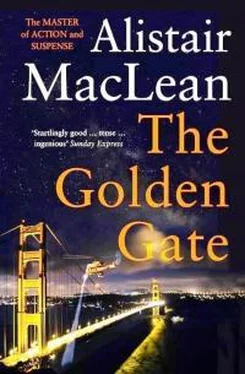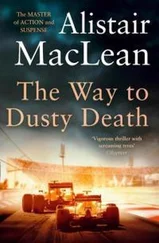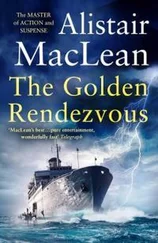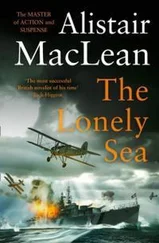They so directed their attention. What they saw could also be seen on the TV set before them. The vehicle looked like a stripped-down, miniaturized golf-cart. It was self-propelled but silent, clearly electrically powered. The driver, Peters, stood on a tiny platform at the rear immediately over the batteries. On the flat steel platform before him was a large coil of very thin rope and, at the very front, a small, double-drummed winch.
At the foot of the ramp, Peters stopped the vehicle. Four men appeared from the rear of the coach. The first two were carrying an obviously very heavy canvas strap of explosives – similar to the one that Branson had earlier demonstrated on TV. This they deposited, very carefully indeed, on the vehicle’s platform beside the rope. The other two men carried objects about eight feet in length: one was a boat-hook, the other an H-sectioned steel beam with butterfly screw clamps at one end and a built-in pulley at the other.
‘The tools of our trade,’ Branson said. ‘You should be able to guess what they’re all for but in any event this will be explained to you when they are put to use. Two things are of particular interest: the explosives and the rope. That strap of explosives is ten feet long and contains thirty beehives of high explosive, each five pounds in weight: the rope, which is a quarter of a mile long, looks, and is, thinner than the average clothes-line, but, as it is made of steel-cored nylon, has a breaking strain of eight hundred pounds which is exactly five times as much as will be required of it.’ He gestured to Peters, who nodded, eased open the circular control wheel and trundled off in the direction of the south tower. Branson looked directly at the TV lens.
He said: ‘For those of you who don’t know, and apart from the citizens of San Francisco there will be many who will not know, those towers are something less than solid structures.’ On the TV set before him and on countless millions of sets throughout the world, the south tower came into sharp, close focus. ‘These towers consist of steel framework boxes called cells. Each is about the size of a phone booth, but twice as high, riveted together and connected by manholes. Each tower consists of over five thousand such cells. They contain elevators and ladders – a rather staggering twenty-three miles of them.’
He reached under his seat and brought up a manual.
‘As you will appreciate, it would be very easy for the inexperienced to get lost inside this labyrinth. Once, when they were building this bridge, two men spent the entire night inside the north tower trying to find their way out and, indeed, Joseph Strauss, the designer and builder of this bridge, was capable of getting completely lost inside the tower. It was with this in mind that Strauss produced this twenty-six-page manual – well, not this one, this is a facsimile I was fortunate enough to come by – instructing inspectors how to find their way about inside the towers.
‘At this moment, two of my men, each with a copy of this manual – although they hardly need them, they’re using the elevator – are at, or nearing, the top of the east tower there, the one facing towards the bay. They are carrying with them nothing except a fifteen-pound weight, the purpose of which you will shortly discover. May we observe the progress of our electric truck, please?’
The telephoto TV camera obligingly descended and closed on Peters, travelling along the wrong side of the bridge. Even as they watched, it slowed and came to a halt almost directly under the lowest of the four massive cross-struts of the south tower.
Branson said: ‘Elevation, please.’
Again the telephoto camera focused on the saddle – the curved steel housing over which the cable passed – on the bayside tower. Almost immediately two men came into sight by the saddle, tiny figures for those directly observing from the middle of the bridge, close-up for those looking at the TV screens.
‘On cue, on time,’ Branson said with some satisfaction. ‘In those matters, co-ordination is of the essence. I dare say that not one in ten thousand of you would care to be where those two men are now. Quite frankly, neither would I. One misstep and it’s over seven hundred and fifty feet down to the Golden Gate: only a seven-second fall but at a hundred and seventy miles an hour hitting water is no different from hitting solid concrete. But those two are as safe as you would be in a church pew. Spidermen, they’re called – the workers you can see standing on girders a thousand feet above the streets of New York or Chicago when they’re building a new skyscraper.’
The camera closed on Peters again. He produced a pistol, unusual as to both length of barrel and width of muzzle, took brief aim upwards and fired. Neither camera could track nor eye see the nature of the missile ejected: what the camera did show, four seconds after firing, was that Bartlett, one of the men by the saddle, had a green cord safely in his hands. He reeled this in swiftly. At the end of the cord was a leather-hung pulley, which in turn was attached to one end of the rope. Two and a half minutes elapsed before the rope was in Bartlett’s hands.
He held this securely while his partner, Boyard, undid both cord and pulley. Bartlett reeled in about another dozen feet, cut this section off with a knife and handed it to Boyard, who secured one end to a strut and another to the strap of the pulley. The rope was then passed through the pulley, through a hole at its top, to a pear-shaped lead weight which the men had brought up with them. Both weight and rope were then released and sank swiftly down to bridge level again.
Peters caught the weight, undid the knot that secured the rope but did not withdraw the rope. Instead he passed it through the pulley in the steel beam and a ring at the end of the boat-hook and secured all three together. He took a few turns of the other end of the rope round one of the drums of the winch and started up the electric motor.
The winch, though small, was powerful and fast. From bridge to saddle took less than a minute and a half. There was a gentle breeze blowing from the north, apparently freshening as the altitude increased, and the rope and its burden swayed quite noticeably, striking each of the cross-struts, at times quite forcibly, on the way up. Peters seemed unconcerned, his gaze fixed on Bartlett. As the rope and its cargo neared the top Bartlett made a horizontal waving motion of his arm. Peters eased the winch drum to a crawl. Bartlett made a slow upwards beckoning motion with his arm then stretched it out horizontally. Peters unwound the rope after stopping the winch, leaving only one turn on the drum.
Bartlett and Boyard pulled in the beam and boat-hook, detached them along with the lead weight, passed the rope through the pulley and resecured the lead weight. They then eased out the H-beam for a distance of about six feet then clamped the inner end to a strut, tightening the butterfly nuts to their maximum. Bartlett signalled Peters who took the last turn off the drum. Weight and rope sank rapidly downwards.
Two minutes later the rope was on its way up again, this time with the canvas strap of explosives which dangled at its full length, fastened to the rope by two heavy metal buckles at one end of the strap. Unlike the previous occasion Peters now moved with great caution, the drum moving very slowly and occasionally stopping altogether. General Cartland commented on this to Branson.
‘Your winchman is trying to eliminate all sway?’
‘Yes. We don’t want that strap of explosives to bang against one of the cross-struts.’
‘Of course. I’d forgotten how sensitive fulminate of mercury detonators are.’
‘The detonators are in Bartlett’s pocket. But the primers can be temperamental too. That’s why we have that extended beam up top – to give clearance. Also, it’s asking a bit much for even two strong men to haul a hundred and sixty pounds – not a hundredweight as you estimated, General – over five hundred feet vertically upwards.’
Читать дальше
Конец ознакомительного отрывка
Купить книгу












